#fire exits
Explore tagged Tumblr posts
Text
Social media needs (dumpster) fire exits

If you'd like an essay-formatted version of this post to read or share, here's a link to it on pluralistic.net, my surveillance-free, ad-free, tracker-free blog:
https://pluralistic.net/2024/12/14/fire-exits/#graceful-failure-modes

Of course you should do everything you can to prevent fires – and also, you should build fire exits, because no matter how hard you try, stuff burns. That includes social media sites.
Social media has its own special form of lock-in: we use social media sites to connect with friends, family members, community members, audiences, comrades, customers…people we love, depend on, and care for. Gathering people together is a profoundly powerful activity, because once people are in one place, they can do things: plan demonstrations, raise funds, organize outings, start movements. Social media systems that attract people then attract more people – the more people there are on a service, the more reasons there are to join that service, and once you join the service, you become a reason for other people to join.
Economists call this the "network effect." Services that increase in value as more people use them are said to enjoy "network effects." But network effects are a trap, because services that grow by connecting people get harder and harder to escape.
That's thanks to something called the "collective action problem." You experience the collective action problems all the time, whenever you try and get your friends together to do something. I mean, you love your friends but goddamn are they a pain in the ass: whether it's deciding what board game to play, what movie to see, or where to go for a drink afterwards, hell is truly other people. Specifically, people that you love but who stubbornly insist on not agreeing to do what you want to do.
You join a social media site because of network effects. You stay because of the collective action problem. And if you leave anyway, you will experience "switching costs." Switching costs are all the things you give up when you leave one product or service and join another. If you leave a social media service, you lose contact with all the people you rely on there.
Social media bosses know all this. They play a game where they try to enshittify things right up to the point where the costs they're imposing on you (with ads, boosted content, undermoderation, overmoderation, AI slop, etc) is just a little less than the switching costs you'd have to bear if you left. That's the revenue maximization strategy of social media: make things shittier for you to make things better for the company, but not so shitty that you go.
The more you love and need the people on the site, the harder it is for you to leave, and the shittier the service can make things for you.
How cursed is that?
But digital technology has an answer. Because computers are so marvelously, miraculously flexible, we can create emergency exits between services so when they turn into raging dumpster fires, you can hit the crash-bar and escape to a better service.
For example, in 2006, when Facebook decided to open its doors to the public – not just college kids with .edu addresses – they understood that most people interested in social media already had accounts on Myspace, a service that had sold to master enshittifier Rupert Murdoch the year before. Myspace users were champing at the bit to leave, but they were holding each other hostage.
To resolve this hostage situation, Facebook gave prospective Myspace users a bot that would take their Myspace login and password and impersonate them on Myspace, scraping all the messages their stay-behind friends had posted for them. These would show up in your Facebook inbox, and when you replied to them, the bot would log back into Myspace as you and autopilot those messages into your outbox, so they'd be delivered to your friends there.
No switching costs, in other words: you could use Facebook and still talk to your Myspace friends, without using Myspace. Without switching costs, there was no collective action problem, because you didn't all have to leave at once. You could trickle from Myspace to Facebook in ones and twos, and stay connected to each other.
Of course, that trickle quickly became a flood. Network effects are a double-edged sword: if you're only stuck to a service because of the people there, then if those people go, there's no reason for you to stick around. The anthropologist danah boyd was able to watch this from the inside, watching Myspace's back-end as whole groups departed en masse:
When I started seeing the disappearance of emotionally sticky nodes, I reached out to members of the MySpace team to share my concerns and they told me that their numbers looked fine. Active uniques were high, the amount of time people spent on the site was continuing to grow, and new accounts were being created at a rate faster than accounts were being closed. I shook my head; I didn’t think that was enough. A few months later, the site started to unravel.
https://www.zephoria.org/thoughts/archives/2022/12/05/what-if-failure-is-the-plan.html
Social media bosses hate the idea of fire exits. For social media enshittifiers, the dumpster fire is a feature, not a bug. If users can escape the minute you turn up the heat, how will you cook them alive?
Facebook nonconsensually hacked fire exits into Myspace and freed all of Rupert Murdoch's hostages. Fire exits represents a huge opportunity for competitors – or at least they did, until the motley collection of rules we call "IP" was cultivated into a thicket that made doing unto Facebook as Facebook did unto Myspace a felony:
https://locusmag.com/2020/09/cory-doctorow-ip/
When Elon Musk set fire to Twitter, people bolted for the exits. The safe harbor they sought out at first was Mastodon, and a wide variety of third party friend-finder services popped up to help Twitter refugees reassemble their networks on Mastodon. All departing Twitter users had to do was put their Mastodon usernames in their bios. The friend-finder services would use the Twitter API to pull the bios of everyone you followed and then automatically follow their Mastodon handles for you. For a couple weeks there, I re-ran a friend-finder service every couple days, discovering dozens and sometimes hundreds of friends in the Fediverse.
Then, Elon Musk shut down the API – bricking up the fire exit. For a time there, Musk even suspended the accounts of Twitter users who mentioned the existence of their Mastodon handles on the platform – the "free speech absolutist" banned millions of his hostages from shouting "fire exit" in a burning theater:
https://www.forbes.com/sites/martineparis/2022/12/17/elon-musk-bans-journalists-on-twitter-as-more-flee-to-mastodon-heres-who-to-follow/
Mastodon is a nonprofit, federated service built on a open standards. Anyone can run a Mastodon server, and the servers all talk to each other. This is like email – you can use your Gmail account to communicate with friends who have Outlook accounts. But when you change email servers, you have to manually email everyone in your contact list to get them to switch over, while Mastodon has an automatic forwarding service that switches everyone you follow, and everyone who follows you, onto a new server. This is more like cellular number-porting, where you can switch from Verizon to T-Mobile and keep your phone number, so your friends don't have to care about which network your phone is on, they just call you and reach you.
This federation with automatic portability is the fire exit of all fire exits. It means that when your server turns into a dumpster fire, you can quit it and go somewhere else and lose none of your social connections – just a couple clicks gets you set up on a server run by someone you trust more or like better than the boss on your old server. And just as with real-world fire exits, you can use this fire exit in non-emergency ways, too – like maybe you just want to hang out on a server that runs faster, or whose users you like more, or that has a cooler name. Click-click-click, and you're in the new place. Change your mind? No problem – click-click-click, and you're back where you started.
This doesn't just protect you from dumpster fires, it's also a flame-retardant, reducing the likelihood of conflagration. A server admin who is going through some kind of enraging event (whomst amongst us etc etc) knows that if they do something stupid and gross to their users, the users can bolt for the exits. That knowledge increases the volume on the quiet voice of sober second thought that keeps us from flying off the handle. And if the admin doesn't listen to that voice? No problem: the fire exit works as an exit – not just as a admin-pacifying measure.
Any public facility should be built with fire exits. Long before fire exits were a legal duty, they were still a widely recognized good idea, and lots of people installed them voluntarily. But after horrorshows like the Triangle Shirtwaist factory fire, fire exits became a legal obligation. Today, the EU's Digital Markets Act imposes a requirement on large platforms to stand up interoperable APIs so that users can quit their services and go to a rival without losing contact with the people they leave behind – it's the world's first fire exit regulation for online platforms.
It won't be the last. Existing data protection laws like California's CCPA, which give users a right to demand copies of their data, arguably impose a duty on Mastodon server hosts to give users the data-files they need to hop from one server to the next. This doesn't just apply to the giant companies that are captured by the EU's DMA (which calls them "very large online platforms," or "VLOPS" – hands-down my favorite weird EU bureaucratic coinage of all time). CCPA would capture pretty much any server hosted in California and possibly and server with Californian users.
Which is OK! It's fine to tell small coffee-shops and offices with three desks that they need a fire exit, provided that installing that fire exit doesn't cost so much to install and maintain that it makes it impossible to run a small business or nonprofit or hobby. A duty to hand over your users' data files isn't a crushing compliance burden – after all, the facility for exporting that file comes built into Mastodon, so all a Mastodon server owner has to do to comply is not turn that facility off. What's more, if there's a dispute about whether a Mastodon server operator has provided a user with the file, we can resolve it by simply asking the server operator to send another copy of the file, or, in extreme cases, to provide a regulator with the file so that they can hand it to the user.
This is a great fire exit design. Fire exits aren't a substitute for making buildings less flammable, but they're a necessity, no matter how diligent the building's owner is about fire suppression. People are right to be pissed off about platform content moderation and content moderation at scale is effectively impossible:
https://www.techdirt.com/2019/11/20/masnicks-impossibility-theorem-content-moderation-scale-is-impossible-to-do-well/
The pain of bad content moderation is not evenly distributed. Typically, the people who get it worst are disfavored minorities with little social power and large cadres of organized bad actors who engage in coordinated harassment campaigns. Ironically, these people also rely more on one another for support (because they are disfavored, disadvantaged, and targeted) than the median user, which means they pay higher switching costs when they leave a platform and lose one another. That means that the people who suffer the worst from content moderation failures are also the people whom a platform can afford to fail most egregiously without losing their business.
It's the "Fiddler on the Roof" problem: sure, the villagers of Anatevka get six kinds of shit kicked out of them by cossacks every 15 minutes, but if they leave the shtetl, they'll lose everything they have. Their wealth isn't material. Anatekvans are peasants with little more than the clothes on their back and a storehouse of banging musical numbers. The wealth of Anatevka is social, it's one another. The only thing worse than living in Anatevka is leaving Anatevka, because the collective action problem dictates that once you leave Anatevka, you lose everyone you love:
https://pluralistic.net/2022/10/29/how-to-leave-dying-social-media-platforms/
Twitter's exodus remains a trickle, albeit one punctuated by the occasional surge when Musk does something particularly odious and the costs of staying come into sharp relief, pushing users to depart. These days, most of these departures are for Bluesky, not Mastodon.
Bluesky, like Mastodon, was conceived of as a federated social service with easy portability between servers that would let users hop from one server to another. The Bluesky codebase and architecture frames out a really ambitious fire-suppression program, with composable, stackable moderation tools and group follow/block lists that make it harder for dumpster fires to break out. I love this stuff: it's innovative in the good sense of "something that makes life better for technology users" (as opposed to the colloquial meaning of "innovative," which is "something that torments locked-in users to make shareholders richer).
But as I said when I opened this essay, "you should do everything you can to prevent fires – and also, you should build fire exits, because no matter how hard to you try, stuff burns."
Bluesky's managers claim they've framed in everything they need to install the fire exits that would let you leave Bluesky and go to a rival server without losing the people you follow and the people who follow you. They've got personal data servers that let you move all your posts. They've got stable, user-controlled identifiers that could maintain connections across federated servers.
But, despite all this, there's no actual fire exits for Bluesky. No Bluesky user has severed all connections with the Bluesky business entity, renounced its terms of service and abandoned their accounts on Bluesky-managed servers without losing their personal connections to the people they left behind.
Those live, ongoing connections to people – not your old posts or your identifiers – impose the highest switching costs for any social media service. Myspace users who were reluctant to leave for the superior lands of Facebook (where, Mark Zuckerberg assured them, they would never face any surveillance – no, really!) were stuck on Rupert Murdoch's sinking ship by their love of one another, not by their old Myspace posts. Giving users who left Myspace the power to continue talking to the users who stayed was what broke the floodgates, leading to the "unraveling" that boyd observed.
Bluesky management has evinced an admirable and (I believe) sincere devotion to their users' wellbeing, and they've amply demonstrated that commitment with capital expenditures on content moderators and tools to allow users to control their own content moderation. They've invested heavily in fire suppression.
But there's still no fire exits on Bluesky. The exits are on the blueprints, they're roughed into the walls, but no one's installed them. Bluesky users' only defense against a dumpster fire is the ongoing goodwill and wisdom of Bluesky management. That's not enough. As I wrote earlier, every social media service where I'm currently locked in by my social connections was founded by someone I knew personally, respected, and liked and respected (and often still like and respect):
https://pluralistic.net/2024/11/02/ulysses-pact/#tie-yourself-to-a-federated-mast
I would love to use Bluesky, not least because I am fast approaching the point where the costs of using Twitter will exceed the benefits. I'm pretty sure that an account on Bluesky would substitute well for the residual value that keeps me glued to Twitter. But the fact that Twitter is such a dumpster fire is why I'm not going to join Bluesky until they install those fire exits. I've learned my lesson: you should never, ever, ever join another service unless they've got working fire exits.
#pluralistic#fire exits#interoperability#federation#bluesky#twitter#mastodon#activitypub#fediverse#enshittification
568 notes
·
View notes
Text

welcome to the world
#crowcraft#dc#kon el#superboy#so many ideas for the tube exit#I KNOW this isn’t how it happened but let me have this. I have things I think about and art is how I get them out before they eat me#this one’s about the moments of dazed confusion. he’d never even felt AIR before do you ever think about that. I think about that all the t#how strange would it be to Know so many things without having experienced them#the few seconds of disconnect here. his brain is firing all his knowledge and a startup ‘hello world’ sequence#but he’s never FELT. ANYTHING before#conner kent#so many strange sensations before it clicks as a ‘huh. so this is air. this is breathing this is thinking this is seeing hearing smelling-‘#ETC. sure babies do this but babies can’t remember shit#IDKK. I JUST THINK AHOUT IT A LOT
5K notes
·
View notes
Text







Sometimes you write four books with demisexual protagonists before you realize that's a thing. Then it becomes your thing.
#ek johnston#the story of owen#prairie fire#a thousand nights#spindle#the druid's call#sky on fire#petty furious#exit pursued by a bear#titan of the stars#the afterward#star wars#aetherbound#that inevitable victorian thing
223 notes
·
View notes
Text

Days i love playing florian
#identity v#idv#florian brand#idv fire investigator#not gonna tag mike bc. hes technically kokichi so#my art#if any of the non idv peeps r confused by this: the guy dressed as kokichi opens the exit gate 30% slower than Florian#i didnt sock kokichi danganronpa out of malice
976 notes
·
View notes
Text
Kiyi is not a Princess - A Look At the Fire Nation's Line of Succession
It's not even that much about Kiyi. But the creators seemingly got so lost in the sauce that their ideas about how absolutist monarchies work are as good as taken out of Disney movies now. So, let's set the record straight.
The Fire Nation line of succession
When it comes to royal lines, there were multiple elements that went into setting the line of succession: descent, sex, legitimacy, religion etc. For the Fire Nation, the ones we have 100% confirmed are descent and legitimacy (this last one seen with the Camellia-Peony War, where Chaejin was excluded from the succession because he was born out of wedlock). I would have gone on a whim to say sex counts as well, however, it is a bit foggy. In the Reckoning of Roku, it is mentioned that Firelord Taiso believed Zeisan (Sozin's younger sister) would have been a more competent ruler but could never become Fire Lord due to being a nonbender (I didn't actually read the book, so if someone who did wants to pitch in with the exact wording, please feel free to). This implies that being a Firebender is a requirement, but being a woman isn't. However, it also implies that Taiso would have been fine with ignoring the descent part (Sozin was older) if he deemed fit. Skipping the firstborn in favour of the second one isn't unheard of when it comes to succession so sure. And he is the absolute monarch, if he wants to pass papers to change the line of succession, he can. It is unclear to me if there is any power in place to veto or block a Fire Lord's ruling on any matter so for all we know, if he wanted, he could have. Plus, the fact that Ozai got crowned over Iroh because it was 'Azulon's dying wish'. For the religion part, it seems like the Fire Sages have to perform the coronation and acknowledge the monarch.
So to make it more digestible, the line of succession (while Azulon was still alive) is: Iroh → Lu Ten (firstborn of the heir) → Ozai → Zuko → Azula. With Lu Ten dead, Iroh MIA (at the time) then we have Ozai → Zuko → Azula. When Iroh came back, he gets added at the end of this line of succession. I am a bit unclear on Iroh in current times because it looks to me like he rescinded his role in the line of succession altogether with deciding to live in Ba Sing Se and letting politically inexperienced Zuko rule instead of taking over for a few years to create some stability.
Right now, we have Fire Lord Zuko and his heir presumptive (aka an heir that can be displaced if the monarch has children) Azula. Unless he wrote a decree to take her out of the line of succession — which would require a lot more brain cells than the writers are willing to give Zuko, not that he had a lot of them when it came to politics to begin with —then she's next in line. It doesn't matter how much anyone wants it or not, if Zuko drops dead tomorrow, Azula gets the throne.
Now, onto the other matter.
How does one become a Princess?
Option 1: You marry into the royal family. For example, Ursa was styled as a Princess, as she married Prince Ozai.
Option 2: You're born in a royal line. For example, Azula is a Princess because her father is a Prince, her grandfather, at the time of her birth, was the ruling monarch of the Fire Nation etc.
Bonus Option it's complicated: Royals had a habit of having children out of wedlock sometimes. Said children, if acknowledged, could be granted titles (Count of X, Dutchess of Y etc.) . Getting acknowledged and a title does not automatically put you in the line of succession, though. For example, Firelord Chaeryu was forced to acknowledge Chaejin and avoid dishonoring his noble mother and her house, but he excluded Chaejin from the royal family.
So Kiyi is not a Princess. Simple as that. Neither of her parents are of the royal line.
Could she become a Princess?
Well, this gets interesting.
Let's start with the fact that Kiyi got a pretty bad deal in a class-based monarchical society.
First thing, while her mother is a noble, her father is a commoner. Even if Ursa's family became destitute after Roku's death because of political reasons, it does not change the fact that she is still nobility unless Sozin revoked Rina's title, which I am not 100% sure he did. We don't know anything about Jinzuk besides the fact that he was the magistrate of Hira'a. While magistrates do not have to be part of the nobility, they can be. He could have been a second/third/fourth son of a small noble family with limited power/resources, given the position he was given was in a place like Hira'a, which is what I am inclining towards. He could have also been just some guy, but someone appointed him, and as a rule of thumb, you don't just go into the street and pick a random person to appoint to an administrative and leadership role, even if it's a small town. Given that Azulon was set on Ozai marrying Ursa because she was Roku's granddaughter, whether or not Jinzuk was a noble, it doesn't matter all that much in the grand scheme of things. However, in Kiyi's case, it does if Zuko wants to give her a title. It's more stigma than anything because people can be given nobility titles for specific services to the crown etc. But this is not her only issue. Which leads me to...
Second thing, Kiyi is a bastard. Which, in my opinion, would hold even more stigma than her father not being a noble. Ursa never divorced Ozai. As far as we know, polygamist marriages aren't a thing in the Fire Nation, so her marriage to Ikem/Noren is invalid. Could she be granted a divorce retroactively by the Fire Sages? Actually, yeah. Because Zuko named Shyu as High Sage, which was like the one sound political move he ever did tbh. We don't see what the Fire Nation's stance on divorce is, but given that Shyu is a Zuko loyalist, he'd probably grant Ursa retroactive divorce from Ozai. I am not a legal expert, however, as far as I know, retroactive decisions tend to be reserved for correcting a mistake or omission in the written record. She was still married to Ozai when she went and married Ikem. Though technically, she married him under a fake identity (and so did he), which might make the marriage void regardless in the eyes of the law. Idk how Spirit involvement affects legal matters in the world of Avatar, but as things stand right now, unless we pretzel-twist ourselves to make excuses, Kiyi is born outside of legitimate wedlock.
Now, Zuko might not care. In fact, he probably doesn't. He could still give Kiyi a title, including that of Princess. It was not uncommon for illegitimate relatives of rulers to be offered roles/titles once acknowledged. The real question is if he would put her in the line of succession. Kiyi has no business being there because she does not have royal blood.
Could Zuko do whatever he wants, give her the title of Princess and shove her in the line of succession while taking Azula out of it for good measure? Sure, he can. He'd probably love that, in fact. But that leaves two things open.
One, nobility would not take kindly to a bastard child of a commoner with no royal blood being in the line of succession. If we also add the angle of taking Azula out of it, it would just increase their ire. There is already a long list of why the nobility is probably angry at Zuko (and should attempt to assassinate him a lot more than they do), but I think this one in particular has other implications. There might be nobles who are neutral about Zuko. Shamelessly discarding societal norms on a whim might make their perspective swing towards negative. It could make him lose goodwill he might have or potential allies.
Two, it will make the commoners wonder. If this random girl, raised as a peasant, with a commoner father, born out of wedlock, can be put in the line of succession just like that — while discarding a princess of the blood if we are at it — then… is the royal line not that special? The whole premise of a monarchy is that the monarch and their descendants have the divine right to rule. Being part of that bloodline gives you the right to rule. So if that can be discarded, if that bloodline is not all that important… should Zuko be Firelord? And most importantly, does the Fire Nation really need a monarch at all?
Kiyi is not a princess, and for the well-being of Zuko's reign — which is already barely holding together — he better not make her one.
#kiyi#atla#atla meta#fire nation#azula#zuko#(tbh the easiest way to pull this is Ursa pretending she was pregnant with Kiyi when she left and she's Ozai's kid)#(that requires her to retain some sharpness from her show appearance instead of being the blandest soggiest piece of character cliche)#(so not happening)#(also you'd have to be a moron to actually buy that but there's no DNA testing so)#the comics really are wasted opportunity after wasted opportunity huh#like this is the source material that gave us Long Feng the the Dai Li plot in Ba Sing Se#and we could have such interesting political intrigues in post war FN#but no#what we do is go actually everyone was good all along#all the characters that matter have always been anti imperialist#indoctrination doesn't exit#fire lord azulon who ruled for like 70+ years?#don't know him#can I see how Zuko brought the Fire Nation from it's war self to the peaceful and prosperous country in LoK?#Ah yes through the power of retconning#my bad for having standards#I mean I also have beef with the way some people in the fandom have no understanding of how monarchies work#but that's expected#what's the writers' excuse?#okay I'll shut up now this got out of hand
184 notes
·
View notes
Text
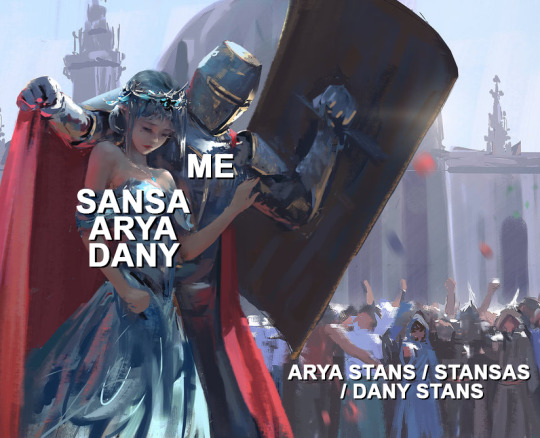
sansa/arya/dany, your stans could never make me hate the other two of you 💞✨
#the real reason we'll never see a dream of spring is because it is actually just a 800+ page picnic that sansa arya and dany are having#and even grrm is struggling to come up with enough food descriptions to fill that many pages#oh you have fantasies about arya killing sansa upon their reunion?#why don't you take some 'ᴛʜᴇ ꜱᴀᴍᴇ ʙʟᴏᴏᴅ ꜰʟᴏᴡꜱ ᴛʜʀᴏᴜɢʜ ʙᴏᴛʜ yᴏᴜʀ ʜᴇᴀʀᴛꜱ. yᴏᴜ ɴᴇᴇᴅ ʜᴇʀ ᴀꜱ ꜱʜᴇ ɴᴇᴇᴅꜱ yᴏᴜ' and lay down for an hour#oh you think sansa is going to exile arya from the north or some adjacent bs?#maybe you should sip on some 'ɪɴ ꜱᴀɴꜱᴀ'ꜱ ᴅʀᴇᴀᴍꜱ ʜᴇʀ ᴄʜɪʟᴅʀᴇɴ ʟᴏᴏᴋᴇᴅ ᴊᴜꜱᴛ ʟɪᴋᴇ ᴛʜᴇ ʙʀᴏᴛʜᴇʀꜱ ꜱʜᴇ ʜᴀᴅ ʟᴏꜱᴛ.#ꜱᴏᴍᴇᴛɪᴍᴇꜱ ᴛʜᴇʀᴇ ᴡᴀꜱ ᴇᴠᴇɴ ᴀ ɢɪʀʟ ᴡʜᴏ ʟᴏᴏᴋᴇᴅ ʟɪᴋᴇ ᴀʀyᴀ' and go for a long walk to clear your head#oh you think the endgame big bad in either stark girls story is dany-another traumatized child who was victimized at the hands of grown men#how fascinating - i am taking fervent notes on your insightful points and definitely not backing away slowly towards the exit#sansa stark#arya stark#daenerys targaryen#asoiaf#got#game of thrones#a song of ice and fire
147 notes
·
View notes
Text






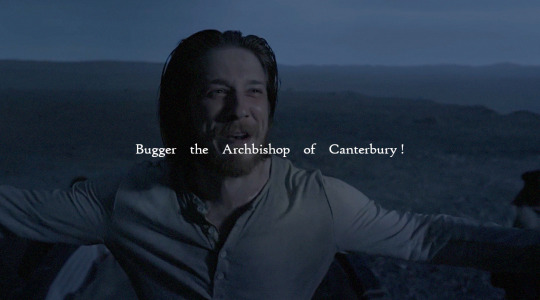




'He sees something in me. Could lead anywhere. Anywhere.'
#the terror#the terror amc#cornelius hickey#something about hickey saying none ever wanted anything from him#and his attempts at 'heroism'/taking action/being the first to intervene#he calls kidnapping silna with a group of men in the middle of the night 'saving crozier'#he's the one who gets the latch open when tuunbaaq's on the ship#and he's the one who clears an exit for the men to escape the carnivale fire#but his 'saving crozier' gets him lashed#no one notices or cares about the latch#and saving the men results in killing mcdonald#a doctor and a person who was genuinely kind to hickey without being condescending#hickey doesnt want to deconstruct or tear down imperialism he wants it to work for him. he wants power and authority#but i think he also is just desperate for a role. some kind of meaning or belonging#he wants to prove his worth or value. why he's above the others. why he should be seen.#anyway.#hickey says none ever wanted nothing from me and i sit and stare at the wall.
151 notes
·
View notes
Text
As much as i hated working in the service industry there was something fun about getting to find out all the things you dont get to see as just a customer like when I worked at a deli a customer once asked me why we only did ham and cheese croissants on random days and I lied telling her it was just which ever day the manager decided but really we only sold them when the croissants from the bakery hadn't sold the previous day
#im eating a ham and cheese croissant rn so thinking about it#really the best things i learned was when i was working at a cinema#at least the one i worked at#finding out the imax screen folds up to reveal a fire exit when the fire alarm goes off#that there was a bunch of hidden corridors#that some movies sent the cinema shirts for the employees to wear and you gotta just keep the shirts#if i were to do a job after retirement itd be cinema work i loved it
234 notes
·
View notes
Text

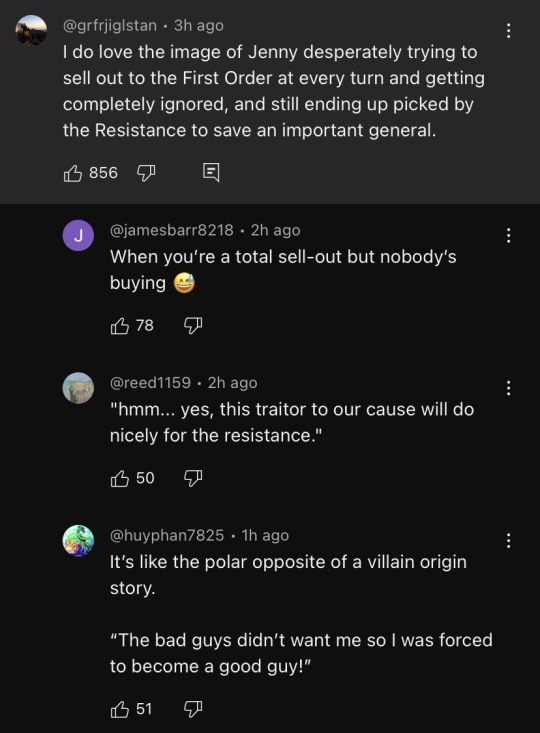




#jenny nicholson#youtube comments#star wars#star wars hotel#disney#she’s too powerful#first order#resistance#chewbacca#fire exit#landlubber alert!#immersive is not even a word anymore now that i heard it so many times
397 notes
·
View notes
Text
Prompt 138
Danny squints up at the blurry form cradling him, brain trying to catch up with his situation. He can feel the pulse of his siblings’ cores nearby, gently pulsing contentedly despite the chaos of his last memories. His limbs feel too small and pudgy, too-small fingers gripping onto something as his vision started to clear.
There was a man, holding him? Cradling his too-small form like he was an infant- was he an infant? He was pretty sure he wasn’t supposed to be, he had been older but now he wasn’t. He squinted up at the stranger, green eyes meeting green. Huh. They kind of looked like he could be their dad or something.
#dcxdp#dpxdc#prompts#league of shadows#Ras gets a trio of infants the first/second time he exits the Lazarus Pits#So very early Ras who semi recently lost his first wife#Phantom siblings are his first kids who keep him semi-sane#As far as Ras is concerned the Pits blessed him with his firstborn sons and daughter#Dusan Nyssa & Talia are grumbling whenever the trio come back home#”Ugh we don’t Want to do Family Time”#”Too bad it’s family time c’mon we brought you all presents”#Danny when Talia brings Jason home: Did you steal a child#Talia: Of course not brother but by chance would you convince Father to let the child stay#Bruce doesn't know about the trio because they were away while he was training with the league#They do know about him though- baby sisters first crush how cute!#Talia where did you get that test tube baby have you informed the other donor- TALIA#“We all know you three are the favorite children”#“No we aren't”#"Danyal you Daig & Eva can literally leave whenever you want as long as you call every week w can barely leave without him being overbearin#Daig means fire/flame#Eva means living & breathing
752 notes
·
View notes
Text
Enshittification isn’t caused by venture capital

Picks and Shovels is a new, standalone technothriller starring Marty Hench, my two-fisted, hard-fighting, tech-scam-busting forensic accountant. You can pre-order it on my latest Kickstarter, which features a brilliant audiobook read by Wil Wheaton.

Many of us have left the big social media platforms; far more of us wish we could leave them; and even those of us who've escaped from Facebook/Insta and Twitter still spend a lot of time trying to figure out how to get the people we care about off of them, too.
It's lazy and easy to think that our friends who are stuck on legacy platforms run by Zuckerberg and Musk lack the self-discipline to wean themselves off of these services, or lack the perspective to understand why it's so urgent to get away from them, or that their "hacked dopamine loops" have addicted them to the zuckermusk algorithms. But if you actually listen to the people who've stayed behind, you'll learn that the main reason our friends stay on legacy platforms is that they care about the other people there more than they hate Zuck or Musk.
They rely on them because they're in a rare-disease support group; or they all coordinate their kids' little league carpools there; or that's where they stay in touch with family and friends they left behind when they emigrated; or they're customers or the audience for creative labor.
All those people might want to leave, too, but it's really hard to agree on where to go, when to go, and how to re-establish your groups when you get somewhere else. Economists call this the "collective action problem." This problem creates "switching costs" – a lot of stuff you'll have to live without if you switch from legacy platforms to new ones. The collective action problem is hard to solve and the switching costs are very high:
https://pluralistic.net/2022/10/29/how-to-leave-dying-social-media-platforms/
That's why people stay behind – not because they lack perspective, or self-discipline, or because their dopamine loops have been hacked by evil techbro sorcerers who used Big Data to fashion history's first functional mind-control ray. They are locked in by real, material things.
Big Tech critics who attribute users' moral failings or platforms' technical prowess to the legacy platforms' "stickiness" are their own worst enemies. These critics have correctly identified that legacy platforms are a serious problem, but have totally failed to understand the nature of that problem or how to fix it. Thankfully, more and more critics are coming to understand that lock-in is the root of the problem, and that anti-lock-in measures like interoperability can address it.
But there's another major gap in the mainstream critique of social media. Critics of zuckermuskian media claim those services are so terrible because they're for-profit entities, capitalist enterprises hitched to the logic of extraction and profit above all else. The problem with this claim is that it doesn't explain the changes to these services. After all, the reason so many of us got on Twitter and Facebook and Instagram is because they used to be a lot of fun. They were useful. They were even great at times.
When tech critics fail to ask why good services turn bad, that failure is just as severe as the failure to ask why people stay when the services rot.
Now, the guy who ran Facebook when it was a great way to form communities and make friends and find old friends is the same guy who who has turned Facebook into a hellscape. There's very good reason to believe that Mark Zuckerberg was always a creep, and he took investment capital very early on, long before he started fucking up the service. So what gives? Did Zuck get a brain parasite that turned him evil? Did his investors get more demanding in their clamor for dividends?
If that's what you think, you need to show your working. Again, by all accounts, Zuck was a monster from day one. Zuck's investors – both the VCs who backed him early and the gigantic institutional funds whose portfolios are stuffed with Meta stock today – are not patient sorts with a reputation for going easy on entrepreneurs who leave money on the table. They've demanded every nickel since the start.
What changed? What caused Zuck to enshittify his service? And, even more importantly for those of us who care about the people locked into Facebook's walled gardens: what stopped him from enshittifying his services in the "good old days?"
At its root, enshittification is a theory about constraints. Companies pursue profit at all costs, but while you may be tempted to focus on the "at all costs" part of that formulation, you musn't neglect the "profits" part. Companies don't pursue unprofitable actions at all costs – they only pursue the plans that they judge are likely to yield profits.
When companies face real competitors, then some enshittificatory gambits are unprofitable, because they'll drive your users to competing platforms. That's why Zuckerberg bought Instagram: he had been turning the screws on Facebook users, and when Instagram came along, millions of those users decided that they hated Zuck more than they loved their friends and so they swallowed the switching costs and defected to Instagram. In an ill-advised middle-of-the-night memo to his CFO, Zuck defended spending $1b on Instagram on the grounds that it would recapture those Facebook escapees:
https://www.theverge.com/2020/7/29/21345723/facebook-instagram-documents-emails-mark-zuckerberg-kevin-systrom-hearing
A company that neutralizes, buys or destroys its competitors can treat its users far worse – invade their privacy, cheap out on moderation and anti-spam, etc – without losing their business. That's why Zuck's motto is "it is better to buy than to compete":
https://www.trtworld.com/magazine/zuckerberg-its-better-to-buy-than-compete-is-facebook-a-monopoly-42243
Of course, as a leftist, I know better than to count on markets as a reliable source of corporate discipline. Even more important than market discipline is government discipline, in the form of regulation. If Zuckerberg feared fines for privacy violations, or moderation failures, or illegal anticompetitive mergers, or fraudulent advertising systems that rip off publishers and advertisers, or other forms of fraud (like the "pivot to video"), he would treat his users better. But Facebook's rise to power took place during the second half of the neoliberal era, when the last shreds of regulatory muscle that survived the Reagan revolution were being devoured by GW Bush and Obama (and then Trump).
As cartels and monopolies took over our economy, most government regulators were neutered and captured. Public agencies were stripped of their powers or put in harness to attack small companies, customers, and suppliers who got in the way of monopolists' rent-extraction. That meant that as Facebook grew, Zuckerberg had less and less to fear from government enforcers who might punish him for enshittification where the markets failed to do so.
But it's worse than that, because Zuckerberg and other tech monopolists figured out how to harness "IP" law to get the government to shut down third-party technology that might help users resist enshittification. IP law is why you can't make a privacy-protecting ad-blocker for an app (and why companies are so desperate to get you to use their apps rather than the open web, and why apps are so dismally enshittified). IP law is why you can't make an alternative client that blocks algorithmic recommendations. IP law is why you can't leave Facebook for a new service and run a scraper that imports your waiting Facebook messages into a different inbox. IP law is why you can't scrape Facebook to catalog the paid political disinformation the company allows on the platform:
https://locusmag.com/2020/09/cory-doctorow-ip/
IP law's growth has coincided with Facebook's ascendancy – the bigger Facebook got, the more tempting it was to interoperators who might want to plug new code into it to protect Facebook users, and the more powers Facebook had to block even the most modest improvements to its service. That meant that Facebook could enshittify even more, without worrying that it would drive users to take unilateral, permanent action that would deprive it of revenue, like blocking ads. Once ad-blocking is illegal (as it is on apps), there's no reason not to make ads as obnoxious as you want.
Of course, many Facebook employees cared about their users, and for most of the 21st century, those workers were a key asset for Facebook. Tech workers were in short supply until just a couple years ago, when the platforms started round after round of brutal layoffs – 260,000 in 2023, another 150,000+ in 2024. Facebook workers may be furious about Zuckerberg killing content moderation, but he's not worried about them quitting – not with a half-million skilled tech workers out there, hunting for jobs. Fuck 'em. Let 'em quit:
https://www.404media.co/its-total-chaos-internally-at-meta-right-now-employees-protest-zuckerbergs-anti-lgbtq-changes/
This is what changed: the collapse of market, government, and labor constraints, and IP law's criminalization of disenshittifying, interoperable add-ons. This is why Zuck, an eternal creep, is now letting his creep flag fly so proudly today. Not because he's a worse person, but because he understands that he can hurt his users and workers to benefit his shareholders without facing any consequences. Zuckerberg 2025 isn't the most evil Zuck, he's the most unconstrained Zuck.
Same goes for Twitter. I mean, obviously, there's been a change in management at Twitter – the guy who's enshittifying it today isn't the guy who enshittified it prior to last year. Musk is speedrunning the enshittification curve, and yet Twitter isn't collapsing. Why not? Because Musk is insulated from consequences for fucking up – he's got a huge cushion of wealth, he's got advertisers who are desperate to reach his users, he's got users who can't afford to leave the service, he's got IP law that he can use to block interoperators who might make it easier to migrate to a better service. He was always a greedy, sadistic asshole. Now he's an unconstrained greedy, sadistic asshole. Musk 2025 isn't a worse person than Musk 2020. He's just more free to act on his evil impulses than he was in years gone by.
These are the two factors that make services terrible: captive users, and no constraints. If your users can't leave, and if you face no consequences for making them miserable (not solely their departure to a competitor, but also fines, criminal charges, worker revolts, and guerrilla warfare with interoperators), then you have the means, motive and opportunity to turn your service into a giant pile of shit.
That's why we got Jack Welch and his acolytes when we did. There were always evil fuckers just like them hanging around, but they didn't get to run GM until Ronald Reagan took away the constraints that would have punished them for turning GE into a giant pile of shit. Every economy is forever a-crawl with parasites and monsters like these, but they don't get to burrow into the system and colonize it until policymakers create rips they can pass through.
In other words, the profit motive itself is not sufficient to cause enshittification – not even when a for-profit firm has to answer to VCs who would shut down the company or fire its leadership in the face of unsatisfactory returns. For-profit companies chase profit. The enshittifying changes to Facebook and Twitter are cruel, but the cruelty isn't the point: the point is profits. If the fines – or criminal charges – Facebook faced for invading our privacy exceeded the ad-targeting revenue it makes by doing so, it would stop spying on us. Facebook wouldn't like it. Zuck would hate it. But he'd do it, because he spies on us to make money, not because he's a voyeur.
To stop enshittification, it is not necessary to eliminate the profit motive – it is only necessary to make enshittification unprofitable.
This is not to defend capitalism. I'm not saying there's a "real capitalism" that's good, and a "crony capitalism" or "monopoly capitalism" that's bad. All flavors of capitalism harm working people and seek to shift wealth and power from the public and democratic institutions to private interests. But that doesn't change the fact that there are, indeed, different flavors of capitalism, and they have different winners and losers. Capitalists who want to sell apps on the App Store or reach customers through Facebook are technofeudalism's losers, while Apple, Facebook, Google, and other Big Tech companies are technofeudalism's great winners.
Smart leftism pays attention to these differences, because they represent the potential fault lines in capitalism's coalition. These people all call themselves capitalists, they all give money and support to political movements that seek to crush worker power and human rights – but when the platforms win, the platforms' business customers lose. They are irreconcilably on different sides of a capitalism-v-capitalism fight that is every bit as important to them as the capitalism-v-socialism fight.
I'm saying that it's good praxis to understand these divisions in capitalism, because then we can exploit those differences to make real, material gains for human thriving and worker rights. Lumping all for-profit businesses together as identical and irredeemable is bad tactics.
Legacy social media is at a turning point. Two new systems built on open standards have emerged as a credible threat to the zuckermuskian model: Mastodon (built on Activitypub) and Bluesky (built on Atproto). The former is far more mature, with a huge network of federated servers run by all different kinds of institutions, from hobbyists to corporations, and it's overseen by a nonprofit. The latter has far more users, and is a VC-backed corporate entity, and while it is hypothetically federatable, there are no Bluesky services apart from the main one that you can leave for if Bluesky starts to enshittify.
That means that Bluesky has a ton of captive users, and has the lack of constraint that characterizes the enshittified legacy platforms it has tempted tens of millions of users away from. This is not a good place to be in, because it means that if the current management choose to enshittify Bluesky, they can, and it will be profitable. It also means that the company's VCs understand that they could replace the current management and replace them with willing enshittifiers and make more money.
This is why Bluesky is in a dangerous place: not because it is backed by VCs, not because it is a for-profit entity, but because it has captive users and no constraints. It's a great party in a sealed building with no fire exits:
https://pluralistic.net/2024/12/14/fire-exits/#graceful-failure-modes
Last week, I endorsed a project called Free Our Feeds, whose goals include hacking some fire exits into Bluesky by force majeure – that is, independently standing up an alternative Bluesky server that people can retreat to if Bluesky management changes, or has a change of heart:
https://pluralistic.net/2025/01/14/contesting-popularity/#everybody-samba
For some Mastodon users, Free Our Feeds is dead on arrival – why bother trying to make a for-profit project safer for its users when Mastodon is a perfectly good nonprofit alternative? Why waste millions developing a standalone Bluesky server rather than spending that money improving things in the Fediverse.
I believe strongly in improving the Fediverse, and I believe in adding the long-overdue federation to Bluesky. That's because my goal isn't the success of the Fediverse – it's the defeat of enshtitification. My answer to "why spend money fixing Bluesky?" is "why leave 20 million people at risk of enshittification when we could not only make them safe, but also create the toolchain to allow many, many organizations to operate a whole federation of Bluesky servers?" If you care about a better internet – and not just the Fediverse – then you should share this goal, too.
Many of the Fediverse's servers are operated by for-profit entities, after all. One of the Fediverse's largest servers (Threads) is owned by Meta. Threads users who feel the bite of Zuckerberg's decision to encourage homophobic, xenophobic and transphobic hate speech will find it easy to escape from Threads: they can set up on any Fediverse server that is federated with Threads and they'll be able to maintain their connections with everyone who stays behind.
The existence of for-profit servers in the Fediverse does not ruin the Fediverse (though I wouldn't personally use one of them). The fact that multiple neo-Nazi groups run their own Mastodon servers does not ruin the Fediverse (though I certainly won't use their servers). Not even the fact that Donald Trump's Truth Social is a Mastodon server does anything to ruin the Fediverse (not using that one, either).
This is the strength of federated, federatable social media – it disciplines enshittifiers by lowering switching costs, and if enshittifiers persist, it makes it easy for users to escape unshitted, because they don't have to solve the collective action problem. Any user can go to any server at any time and stay in touch with everyone else.
Mastodon was born free: free code, with free federation as a priority. Bluesky was not: it was born within a for-profit public benefit corporation whose charter offers some defenses against enshittification, but lacks the most decisive one: the federation that would let users escape should escape become necessary.
The fact that Mastodon was born free is quite unusual in the annals of the fight for a free internet. Most of the internet was born proprietary and had freedom foisted upon it. Unix was born within Bell Labs, property of the convicted monopolist AT&T. The GNU/Linux project set it free.
SMB was born proprietary within corporate walls of Microsoft, another corporate monopolist. SAMBA set it free.
The Office file formats were also born proprietary within Microsoft's walled garden: they were set free by hacker-activists who fought through a thick bureaucratic morass and Microsoft fuckery (including literally refusing to allow chairs to be set for advocates for Open Document Format) to give us formats that underlie everything from LibreOffice to Google Docs, Office365 to your web browser.
There is nothing unusual, in other words, about hacking freedom into something that is proprietary or just insufficiently free. That's totally normal. It's how we got almost everything great about computers.
Mastodon's progenitors should be praised for ensuring their creation was born free – but the fact that Bluesky isn't free enough is no reason to turn our back on it. Our response to anything that locks in the people we care about must be to shatter those locks, not abandon the people bound by the locks because they didn't heed to our warnings.
Audre Lorde is far smarter than me, but when she wrote that "the master's tools will never dismantle the master's house," she was wrong. There is no toolset better suited to conduct an orderly dismantling of a structure than the tools that built it. You can be sure it'll have all the right screwdriver bits, wrenches, hexkeys and sockets.
Bluesky is fine. It has features I significantly prefer to Mastodon's equivalent. Composable moderation is amazing, both a technical triumph and a triumph of human-centered design:
https://bsky.social/about/blog/4-13-2023-moderation
I hope Mastodon adopts those features. If someone starts a project to copy all of Bluesky's best features over to Mastodon, I'll put my name to the crowdfunding campaign in a second.
But Mastodon has one feature that Bluesky sorely lacks – the federation that imposes antienshittificatory discipline on companies and offers an enshittification fire-exit for users if the discipline fails. It's long past time that someone copied that feature over to Bluesky.

Check out my Kickstarter to pre-order copies of my next novel, Picks and Shovels!

If you'd like an essay-formatted version of this post to read or share, here's a link to it on pluralistic.net, my surveillance-free, ad-free, tracker-free blog:
https://pluralistic.net/2025/01/20/capitalist-unrealism/#praxis
#pluralistic#enshittification#bluesky#adversarial interoperability#comcom#praxis#leftism#capitalist unrealism#fracture lines#technofeudalism#profits#rents#captive users#switching costs#mastodon#fediverse#activitypub#fire exits#social media#collective action problems#jack welch#atproto#federation#if you're not paying for the product you're the product#even if you're paying for the product you're the product
212 notes
·
View notes
Text
Help why do they look like they’re in a meeting with a principal because their son did something stupid.

#the bear#sydcarmy#carmy berzatto#sydney adamu#just ignore the exit sign and here me out#he set something on fire during Chem class again didn’t he#his name is Mikey and he’s his fathers son#and his uncles nephew#Sydney: *glares at Carm*#Carm: well I didn’t tell him to do it!#Syd: no but he’s all your side of the family#they have a daughter too (twins) Inez who while reserved is very polite#she just draws in her notebook most of the time
356 notes
·
View notes
Text

from the shelf: thanksgiving 2006, ocean vuong (from “night sky with exit wounds”)
#ocean vuong#lit#poetry#typography#american literature#contemporary poetry#quotes#reading#night sky with exit wounds#b: from the shelf#prose#on living#on life#survivor#on survival#fire and spite
104 notes
·
View notes
Text

how it feels being on youtube as a person that has fun in this game
899 notes
·
View notes
Text
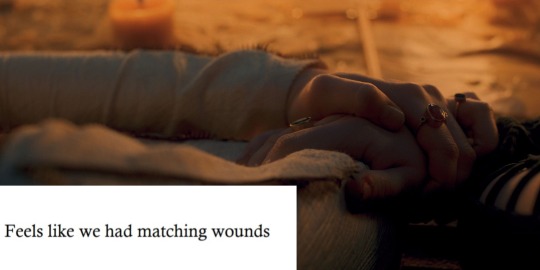

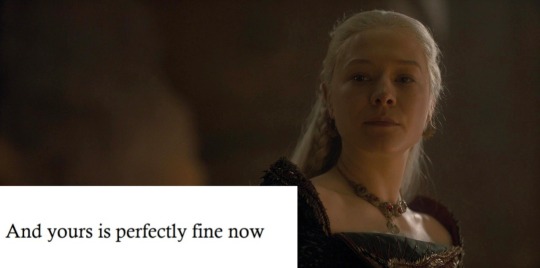


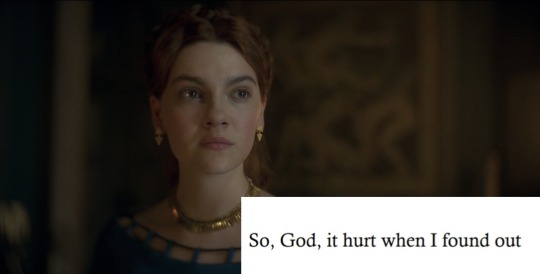
The exit, Conan Gray//House of the Dragon (2022-)
#rhaenicent#alicent hightower#rhaenyra targaryen#olivia cooke#emily carey#milly alcock#emma d’arcy#house of the dragon#hotd#got#game of thrones#asoiaf#a song of ice and fire#rhaenyra x alicent#alicent x rhaenyra#conan gray#the exit#web weaving#quotes#words#mine#wlw#sapphic#queer#lgbtq+#angst#lovers to enemies#childhood friends#heartbreak#hands
628 notes
·
View notes
Text
The Simpsons - Fear of Flying, 1994
#6-11#1994#fear of flying#the simpsons#12/18#1990s#television#tv#cartoon#animation#video#she she lounge#bar#lesbian bar#lgbt#lgbtq#lgbtqia#fire exit
36 notes
·
View notes